Tes SEND Show 2023: Keynote on SEND superpowers and supporting students

Last weekend, the SEND Network attended the Tes SEND Show, the annual show with talks from experts across the sector and exhibition stands highlighting the work done to help children and young people with SEND. The show staged a fascinating keynote, hosted by the show’s head of content and event director Beverley Walters, featured guest speakers Dr Tracy Packiam Alloway and Marie Gentles. The talk focused on Harnessing the memory superpowers of children with additional needs.
The keynote began with a presentation from Alloway, an award-winning psychologist, specialising in memory and the brain, who covered different additional needs, such as dyslexia, ADHD and autism, and explained how they affect a person’s brain.
So how do these needs affect the brain and working memory? Here are Tracy Packiam Alloway’s key points:
- Dyslexia: Those with dyslexia tend to have a specific deficit in verbal working memory. This can impair their phonological awareness.
- Autism: Links between the left and right sides of the brain of a person with autism are less frequent than those without autism. This impacts working memory as they may find it challenging to quickly switch between tasks which can result in a sensory overload.
- ADHD: People with ADHD have a weaker visual working memory relative to their verbal working memory. This means they work quickly, may be impulsive and work on inhibition.
However, the fact that a person’s brain works differently, does not mean they are less effective. Alloway pointed out that people with these additional needs have ‘superpowers’, and understanding these superpowers can help us support them better in the classroom.
- Dyslexia: Those with dyslexia have a great photographic memory. They are more likely to remember where something is on a page and are great with locations.
- Autism: People with autism can have a great long-term memory, especially in their area of interest.
- ADHD: People with ADHD are great problem solvers and can think outside the box.
Alloway gave some pointers on how to help children with these additional needs in the classroom. Some examples of these are giving children with ADHD shorter tasks, between 5 to 10 minutes, to help encourage short bursts of effort. A child with autism might need their environment streamlined, for example, by using of noise-cancelling headphones to help their concentration. For children with dyslexia, focusing on using visual aids and encouraging them to use their ‘bird's eye view’ visual memory can help when reading and writing.
The talk then moved on to a discussion with Alloway and Marie Gentles, one of the UK’s leading child behavioural experts, former headteacher and behaviour adviser in the Department for Education. Gentles highlighted the importance of adapting support in classrooms for children with SEND:
If we can change our mindset, change our perceptions, and begin to really understand why a young person's behaviour looks as it does and what needs are not being met, we can support the entire class.
She noted that this is not about condoning behaviour but instead questioning why it is happening. Acknowledging this ultimately reduces ‘undesirable’ behaviour over time, benefitting the whole class. Improving support also increases a child's self-esteem, by being able to acknowledge their superpowers as a young person with SEND, rather than seeing it as a burden.
Alloway noted that a lack of support “affects their individual sense of self-esteem and their identity, and they begin to create this idea of learned helplessness. As teachers, we need to allow the child to recognise that they have agency in their own learning process.”
At the end of the talk, Gentles stressed the significance not just of student self-esteem but also that of teachers and SEND practitioners. The panel agreed that feeling confident in the knowledge held as teachers and SENCOs that enable the support of young people in classrooms is vital. This confidence in abilities can come from having a supportive network of people, both in the school you work in and beyond. Gentles concluded:
It starts with things like this. Like the SEND show, attending seminars, communicating with like-minded people, creating communities. It can feel quite isolating sometimes for us; thinking you're the only one and the only school when actually, there are loads of others in the same field doing the same thing with some great advice."
More content on the show to follow.
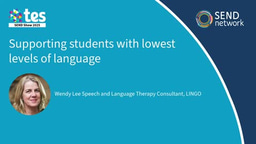
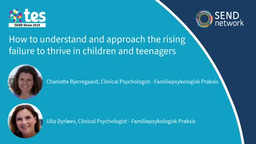
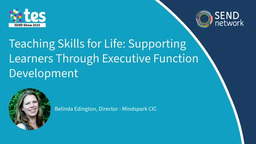
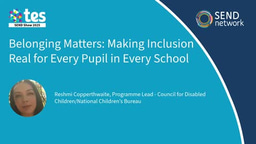
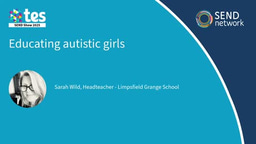
Please sign in or register for FREE
If you are a registered user on SEND Network, please sign in